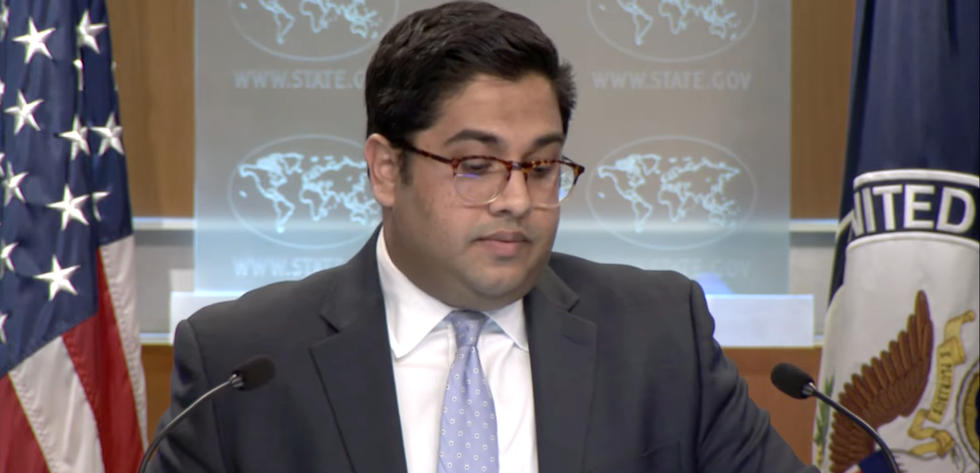
Yesterday in a shocking exchange at the State Department, the spokesman for Biden’s foreign policy team refused to describe Palestinians in Jenin and other areas of the West Bank as living under military occupation by Israel.
In the wake of an Israeli military raid that killed ten Palestinians in Jenin, Vedant Patel of the State Department was repeatedly asked if they were occupied, and evaded the question:
Said Arikat of Al Quds newspaper: What is the status of the Palestinian people in the West Bank, including Jenin… and everywhere else in the West Bank? It’s a simple question. Are they under occupation?
Patel: Said, let me say a couple of things to the point that I believe —
Arikat: Vedant, are they occupied or are they not occupied? What is the status that you give the Palestinians right at this moment? What kind of status do they have?
Patel: Said, the recent period has seen a sharp and —
Arikat: I’m not talking about a recent period. I am saying about legally, how do you designate the Palestinians in the West Bank? What is their status?
Patel: Said, I understand the question you’re asking, and I – as we’ve said previously, it is vital for both sides to take action to prevent even greater loss, and we condemn any violence, escalation, or provocation
So Secretary of State Antony Blinken is about to fly out to meet with Israeli leaders, and the Biden administration appears to be adopting Trump’s reflexively pro-Israel policies in yet another area. In addition to not reversing the formal recognition of Jerusalem as Israel’s capital and accepting the recognition of Israel’s annexation of the Golan Heights, Biden is now emulating Trump’s acceptance of the occupation (as in Trump’s declaration that the settlements are not illegal).
Department of State Daily Press Briefing – January 26, 2023youtu.be
Biden has sent mixed signals over the occupation. Biden forces stripped the Democratic Party platform in 2020 of any references to occupation or settlements as language that could hinder his election campaign. In Antony Blinken’s January 2021 Senate confirmation hearing to be secretary of state, Blinken avoided any mention of Israeli occupation or settlements and trumpeted Biden’s long support for Israel and said he wanted to continue the “progress” of Trump’s policy of normalizing Israel’s relations with Arab monarchies.
But Biden has backed U.N. resolutions that oppose the occupation, and last October Ned Price of the State Department conceded under questioning from Said Arikat that the U.S. regards the territories as under military occupation.
Do you dispute that the Palestinians are militarily occupied, that Israel has annexed Palestinian land? Do you dispute that? Do you dispute that they have forcibly removed populations? Do you dispute that? Do you have any other different kind of information that can convince the world that you’re speaking to that this – these tactics you cited are, in fact, are not – that’s not what the Palestinians are experiencing?
Price: Said, we’ve spoken to the reality, to the plight that Palestinians face.
Arikat: I’m sorry, Ned. I’m not talking about the plight and reality and so on. Do you dispute that they are militarily occupied?
Price: We don’t dispute that. And we’ve been clear about that this historical fact that the West Bank has been occupied since 1967.
Yesterday the State Department was not so clear about the historical facts. Matt Lee asked Patel what Palestinians were to do with their grievances — since the U.S. opposes them taking them to the International Criminal Court at the Hague.
Lee: Whether or not their grievance or grievances are legitimate or not, where exactly are the Palestinians supposed to take them? Do they – if you don’t think that they can go or should go to the UN or to the ICC or to another international forum, where do they take them to?
Patel: Our belief is that this is something that should be engaged on through dialogue, through diplomacy between the Israelis, between the Palestinian Authority. And of course the United States has made its opinion on this very clear.
Lee: Well, you haven’t made your opinion very clear. So you think that this should – that the Palestinians should take their complaints, their grievances, to the Israeli court system?
Patel: I’m not just speaking about the court system specifically, Matt. I’m saying that… this is something that we think that should be addressed through dialogue and diplomacy between the Israelis and the Palestinian Authority, and we’ve said that quite consistently.
Said Arikat followed up by asking if Palestinians are occupied.
Q: What is the status of the Palestinian people in the West Bank, including Jenin, including the camp of Jenin, and everywhere else in the West Bank? How do you designate them? What kind of designations do you give the Palestinians in the West Bank?
A: That they reside in that – those territories.
Q: They reside in that – they’re totally independent of the rest of the world, as if it were a different planet. Are they occupied, for instance? Do you – do you subscribe to the fact that they are under a military occupation?
Arikat went on to challenge Patel for parroting Israeli talking points about the Israeli raid on Jenin yesterday that killed ten people.
Q: You just basically recited the Israeli story that they are nine militants killed and one civilian, as if you were sure of that fact, even before an investigation went on.
Where should the Palestinians go for protection? I’ve asked this question many times in this room. How should the Palestinians be protected?
A: Said, we have been very clear and we believe that there is an urgent need for all parties to de-escalate and to work together to improve the security situation in the West Bank.
Arikat then went on to state, if Palestinians are occupied, then they are a “captive people” against whom collective punishment must be considered a war crime. “Is it your view that collective punishment is a war crime?”
Patel responded:
Said, I’m just – I think I’ve spoken to this pretty extensively, and what I’m just going to reiterate again is that we believe that there’s an urgent need for all parties to de-escalate and to work together to improve the security situation.
Q. Can you call on the Israelis to de-escalate? Do they listen to you when you tell them to de-escalate and not to attack innocent Palestinians day-in and day-out?
MR PATEL: Said, we have consistently called on both sides to de-escalate, and we have consistently spoken about our – the need for both Palestinians and Israelis to equally— deserve to live safely and securely.
QUESTION: And if they don’t listen to you, where should they go? Just to follow on where Matt began, where should the Palestinians go?
MR PATEL: Again, Said, we continue to believe that this is something that can be discussed through dialogue and diplomacy between both parties.




